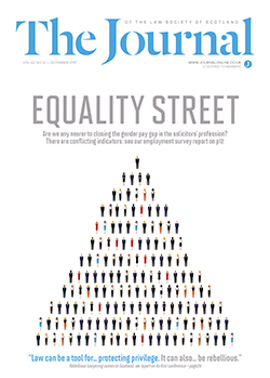Scaling the depths
Whenever someone waxes lyrical about their “traditional values”, it is a signal that they believe they embody the finest human qualities. But not all traditions are worth preserving, as I was reminded reading a recent Scotsman article by Scottish Law Agents Society President Michael Sheridan. It was a cri de coeur for the reintroduction of scale fees, a development he acknowledges on his Society’s website, though not in the piece, as being, “widely regarded among the legal profession and elsewhere as being unlikely, infeasible and unattractive”.
Sheridan’s argument is cloaked in alleged public interest concerns. He rails against the irksome “modern requirement that solicitors compete with each other on the fees charged for their services”, rather than on the quality of those services, and concludes this means that clients “flit from one firm to another in pursuit of cheaper quotations”. Solicitors, he says, “face the dilemma of either quoting a fee which allows for the work to be carried out properly and thoroughly, or a fee more likely to attract or retain business”. One might call this the Stella Artois defence: to be any good, lawyers must be reassuringly expensive.
Scale fees were in force when I came into the law in the early 70s. They were great – for solicitors.
Great for their pockets, that is, but terrible in other ways. They bred complacency and discouraged value for money. They gave the profession a fat cat image which in places was justified, and ultimately they became unsustainable. There is as much chance of them making a comeback as solicitors being paid in guineas, or describing themselves these days as law agents.
But though Michael Sheridan tilts at a false dilemma – as good firms demonstrate every day, there is no inherent conflict between delivering a fine service and competitive fees – the challenge he describes is real. How do lawyers compete successfully in markets such as conveyancing, where suppliers are plentiful, standing out is difficult, and clients regard the service as a commodity? The answer is double-headed: lower the cost of delivery as far as possible, consistent with maintaining quality, and be as professional about selling the service as delivering it. Firms have made great strides on the first, but not so much on the second.
Professionals as salespeople?
The challenge of making the sale is particularly tough for professionals. In most other enterprises, manufacturing and selling are separate disciplines. But professionals are expected to be good at both. Even when they are supported by sales and marketing teams, they are in the front line, a position which often leaves them feeling exposed and uncomfortable. Their choices are stark: follow the White Queen and believe in six impossible things before breakfast, such as a world of no competition and scale fees, or face up to the task, or rather tasks, the first of which is to understand how clients think. For while some are promiscuous and “flit from one firm to another in pursuit of cheaper quotations”, they are not the majority. Cost really matters, but it is a myth that clients are driven only by price. They understand that what their lawyers do for them is always important and may be complex. Above all, they are buying the absence, or at least the minimisation of risk, and a reassuring personal relationship.
What does this mean in practice? It certainly does not mean a lemming-like race to the bottom. It means: lawyers listening closely to what clients are saying about their experience, and acting insightfully on what they hear; having confidence in the value they bring to the table, and articulating it clearly; and having the sense and humility to invest in training for themselves and their teams, so that they become comfortable having sales conversations. This includes looking at how great sales organisations in other sectors operate, and what brings them success; developing sophistication in pricing, so that clients are not just offered a fee, then a panicky reduction at the first sign of hesitation, but given a range of choices which inform and entice; engaging quality sales and marketing support, either freelance or in-house, which is now remarkably affordable; individual lawyers building their profile as experts, and developing fruitful networks; being willing to fail, as will happen, and learning from the experience.
It also means believing that competition “in every nook and cranny” of commercial life is a public good, not the curse Michael Sheridan claims it to be. The mirror it holds up forces us to confront how good or otherwise we are. It can be deeply uncomfortable, but it is also the most important reason why today’s firms deliver a combination of quality and value for money on a different scale to their cosily insulated forebears.
In this issue
- GDPR: do you need a data protection officer?
- Prospectus to buy into
- From Milngavie to the Middle East
- Devolution after the Brexit hurly burly
- Reading for pleasure
- Opinion: Janys M Scott
- Book reviews
- Profile
- President's column
- Forward from a landmark year
- People on the move
- Equality: is it practised?
- Alcohol pricing: a measured response?
- Private tenancies: rebalancing or just upheaval?
- Spending means savings: legal aid study
- Too late, too late?
- RebLaw Scotland – join the rebellion
- Sentences: having the last word
- Insolvency and jurisdiction update: stating the obvious?
- When threats are OK
- Enter yet another tenancy
- Rights of the funded
- Registration rejections – more than formalities
- Heritage holder
- Public policy highlights
- Society's first MOOC opens legal learning to all
- Where there's a will...
- Resolution for the new year
- Q & A corner
- A year to accredit
- Dilapidations: the pitfalls
- Scaling the depths
- Equality: a matter of choice?






